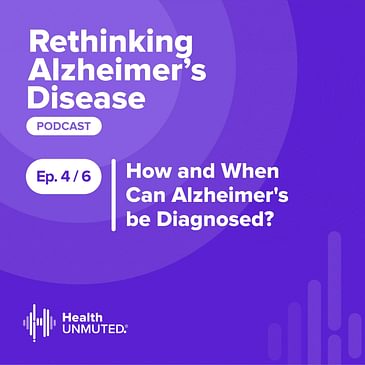Until recently, it was difficult for doctors to diagnose Alzheimer’s disease with the limited tests available. Thankfully, there are now many different options to help doctors make an accurate diagnosis of Alzheimer’s disease, even in its earliest stages.
In this episode of the "Rethinking Alzheimer's Disease" podcast, we learn about the tests that can help doctors tell whether someone is at risk of developing Alzheimer’s disease.
Dr. Sharon Cohen, who knows about Alzheimer's both as a doctor and through her own family, shares how important it is to catch the signs early. She explains the steps of figuring out if someone has Alzheimer's, starting with noticing small changes in memory or mood, to more detailed checks by doctors, and even special scans that look at brain health. She also talks about the different reasons someone might start forgetting things or acting differently, and why it's crucial to get these symptoms checked out. It's not always Alzheimer's; sometimes, other health issues could be the cause.
Until just a few years ago, treatments could only help treat symptoms, not actually slow down the disease. Now, there's hope with advances that can change the course of the disease. Dr. Cohen stresses that knowing about Alzheimer's early gives people more choices, like planning ahead, deciding on treatments, or joining studies for new medicines.
The episode wraps up by encouraging people with Alzheimer's and their families to learn more and get support from organizations and doctors. This way, they don't have to face Alzheimer's alone and can find the best way to deal with it.
For links to resources and information covered in this series, visit our website at HealthUnmuted.com/resources
What did you think of this episode? We’d love to hear from you. Please visit healthunmuted.com/feedback to let us know!
Rethinking Alzheimer’s Disease was made possible with support from Eisai Inc.
[01:49] Personal Insights from Dr. Sharon Cohen
[02:31] What are the four steps to an Alzheimer's evaluation?
[03:05] Step 1: Identifying early signs and symptoms
[06:10] Step 2: Getting initial assessments - cognitive tests and medical history
[08:19] Step 3: Referral to a neurologist and biomarker testing
[11:01] Step 4: Diagnosis and management of Alzheimer’s disease
[12:33] Navigating diagnosis and treatment options
Disclaimer: The content provided in this podcast is intended for informational purposes only. It is not a substitute for professional medical advice, diagnosis, or treatment. Always seek the advice of your physician or other qualified healthcare provider with any questions you may have regarding a medical condition. Never disregard professional medical advice or delay in seeking it because of something you have heard on this podcast. Reliance on any information provided by this podcast or its guests is solely at your own risk.
©2024 Mission Based Media Ltd • April 2024 • AD-M2059






